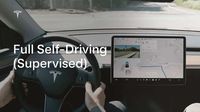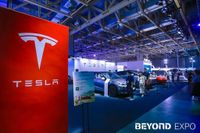On March 23, 2025, reports emerged that Tesla has decided to temporarily pause its Full Self-Driving (FSD) trial in China, leaving the resumption date unclear. This decision follows an initial announcement on March 17, 2025, when Tesla launched a one-month limited-time experience event for its FSD, aimed at enhancing user engagement with the technology.
The FSD initiative, which Tesla labels as a level 2 (L2) automation system, necessitates human supervision. According to the Society of Automotive Engineers and China’s “Automotive Driving Automation Classification,” L2 does not fully align with autonomous driving standards. Tesla’s statement reflects the ongoing dialogue surrounding the regulatory landscape for autonomous technologies in China.
This latest development adds a layer of uncertainty to Tesla’s plans to roll out the FSD in China and Europe, which were initially projected to occur in the first quarter of 2025. Back in September 2024, Tesla indicated that regulatory approval was still needed before these vehicles could be fully launched.
Chinese blogger 胖虎Shawn, who reported the halt on microblogging platform Weibo, highlighted that it remains unknown when Tesla would resume the planned promotional trial. There is rising speculation that the pause may be linked to compliance issues with the Chinese government that oversee the required procedures for over-the-air software updates.
Alongside these challenges, Xpeng, another major player in the intelligent driving arena, recently updated its community regarding a delay in software updates for its vehicle models due to new regulations set forth by the Chinese Ministry of Industry and Information Technology (MIIT). These regulations require that any key software changes must be announced ahead of time, indicating a tightening grip on software deployment in the automotive sector, where rapid innovation is common.
As the landscape of intelligent driving technology evolves in China, its growth is significant, with companies like BYD making bold statements about the imminent arrival of a universal intelligent driving era. The increased competition in this sector, alongside pressures from government regulations, underlines the complicated journey automakers face in integrating advanced technologies while adhering to stringent compliance measures.
Despite the ongoing assessments of Tesla's capabilities, there remains a keen interest among consumers for features that promise increased automation and safety. The situation not only reflects the broader concerns around automation regulation but also the complexities of consumer expectations in the face of regulatory scrutiny.
Future developments around Tesla's FSD and broader industry movements will be closely watched, particularly as consumers and regulatory bodies seek clarity on the evolving role of technology in driving safety and innovation.
This significant pause might resonate through the automotive industry, influencing consumer sentiment and expectations surrounding advanced driver assistance systems. As Tesla figures out its next steps, the implications of these decisions could ripple through the tech landscape, affecting competitive narratives with companies keen on positioning themselves as leaders in the automotive evolution.





